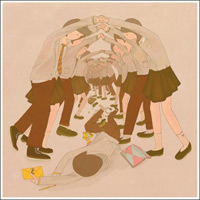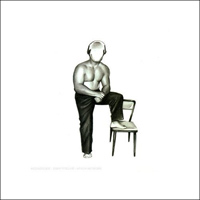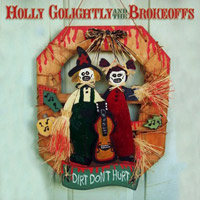
XOXO, Panda and the New Kid Revival
Mush
Over the last decade or so, Mark Bianchi, a.k.a. Her Space Holiday, has been a truly iconoclastic creative force, making eloquent electronic statements that were at once self-referential and self-deprecating. Musically, his work was detailed and intricate, while lyrically he possessed an awareness both of himself and the fact that someone was more than likely listening.
Still however persuasive albums like Manic Expressive and The Young Machines were, years later they can seem a little quaint. As such, Bianchi has decided to divorce himself from the tools he’s so long made his trade. For XOXO, Panda and the New Kid Revival, he’s moved to the other end of the spectrum, abandoning the laptop for a bevy of natural noisemakers. In some ways the approach is suspect; having become so adept at creating music from artificial means does Bianchi really need to go a pedestrian route to do something different? Whatever the answer to that question, here his main tools are a couple of guitars. Throughout the record, though, he adds plenty more. The album’s title track, “The New Kid Revival,” fashions a hand-clapped rhythm and a keyboard backing for what’s just a basic pop song, but a good one at that. And generally that’s what each song here is: basic. However, novel the tack may be to Bianchi, the results are not so unlike that of many others. Exceptions like “Four Tapping Shoes and a Kiss” (imagine the Jesus and Mary Chain if they added ukulele and harmonica) and “Two Tin Cans and a Length of String” (a piano bar populated by noiseniks) aside, the record never reveals anything extraordinary. And that’s too bad, as that’s something Bianchi has done several times before.
Stephen Slaybaugh

Offend Maggie
Kill Rock Stars
I first had the Shaggs explained to me as sounding as though they’d never heard music before. The songs they wrote and played just didn’t sound right. The parts didn’t go together. They weren’t playing in the same key. Yet somehow, they managed to fashion that noise into bizarre pop songs. That’s how I felt the first time I heard Deerhoof. There are so many different elements coming together that the songs almost don’t make sense. Coming from anyone else they wouldn’t, but coming from Deerhoof, it sounds like, well, Deerhoof.
Offend Maggie is the latest in a steady stream of releases from Deerhoof. This doesn’t differ much from the band’s last few records. If anything, this is one of the catchiest Deerhoof records. “Family of Others” almost sounds like a lost Beach Boys track and is the only song not sung by Satomi Matsuzaki. There are a more acoustic guitars on this one, and “Don’t Get Born” could almost pass for a ballad. Almost. There are plenty of classic Deerhoof moments here too. Album opener “The Tears and Music of Love” and “Chandelier Searchlight” are tightly wound, prog-informed no wave tracks. “This Is God Speaking” sounds like a polished up Siltbreeze recording.
This is a solid Deerhoof record. I doubt that anyone who doesn’t get Deerhoof is going to be converted by Offend Maggie, but it also futher cements the fact that Deerhoof are distictly Deerhoof. They don’t sound like anyone but themselves, and that’s an accomplishment these days.
Tom Butler
MP3: “Offend Maggie”

Dirt Don’t Hurt
Transdreamer
As far as pushing the cutting edge goes, writing songs that update the “old-timey” sound isn’t that far of a stretch toward the unknown. However—as with any musical genre—some bands pull it off convincingly, other bands couldn’t sell it wrapped in diamonds with $100 bills for liner notes. Holly Golightly has been mining long dead genres, or at least once-popular but now only cult-followed genres, since the beginning of her musical career. It seems as if she’s working backward through time as well, since the first few records were ‘60s throwback mod garage rave-ups and Dirt Don’t Hurt, her 19th release, is Southern murder balladry and junkyard percussion. She is also a renowned collector of old rare music, from which she probably culls plenty of inspiration. Now, though, she has gone so far back in time—before mass wax production—that she can no longer find the music she wants at record shops and has to don hazmat gear to dig for the type of sound she wants ing the creepy condemned spinster’s haunted house that inhabits every neighborhood.
Perhaps she’s sick of all that hard work, so she just decided to make those records herself. She sounds like an authentic backporch corn whiskey stiller taking a break to taste the mash, strumming on a weathered, steel-stringed acoustic guitar, her neighbor clanging along on the mason jars and whiskey jugs. There are a few drinking songs, a few duets, a few scorned lover songs, and even one praising the Lord. The themes are old, even archetypal, the words tried but not tired, the sentiments aged like good booze. The only problem is the production. To capture that “old-timey” feel, Holly Golightly and the Brokeoffs went into a studio in Spain (Circo Perrotti) known for all its vintage gear and high-end analog equipment. The problem with some analog equipment is that it will change the sound you hear like Midas changes things to gold. Lawyer Dave may have been clicking on a Coke can for percussion on “Burn Your Fun,” but the ultra hi-fi gear enhances it to the point where it sounds like a $2,000 Artisan Crafted Cold Formed Aluminum Cylinder. While they may not have been aiming for a bullseye reproduction of 1920s bog folk, it’s hard to reconcile the hyper high fidelity sound with the timeless nature of the music. This record should have been recorded in the hull of a pirate ship stuck in Sargassum, or maybe in a shed near the Mississippi Bayou. But weirdly enough, Holly Golighty and long time collaborator Lawyer Dave (the Brokeoffs) took a chance in a plush studio on a brief break from a 50-date tour. The fact remains that the music sounds authentic, the words sound heartfelt, and Holly Golightly has earned the right to record a hi-fi bluesy saloon record if she pleases.
Michael P. O’Shaughnessy

Elephants... Teeth Sinking Into Heart
Warner Bros.
After four years of delays, Rachel Yamagata felt she had to release two records in one. Elephants features the darker, more intimate songs, while Yamagata saved the more “Tom Waits-flavored rock tunes” for Teeth Sinking Into Heart.
The opening track, “Elephants,” elicits high drama from the slow fade-in of gentle chords to the drum-rolls and strings that join Yamagata’s droll piano playing. The song is foreboding and a little bit sinister; Yamagata’s lyrics veer from threatened to threatening as she sings, “Throw yourself in the midst of danger, but keep one eye open at night.”
The quietude increases on “What I Leave,” and Yamagata starts showing the range of her breathy voice. Limited though it may be, she makes the most of it, at times doubling herself for harmony and chorus effects here and elsewhere. Over the course of the next seven tracks, though, little changes but the subject matter. Strings support Yamagata’s keys, and there’s the occasional tension and release. They’re all sad stories of one sort or another, and the only real question is whether they’ll be placid all the way through, or whether we’ll hear Yamagata’s anger stirring.
And as if her own airy singing weren’t enough, Rachel brings in Ray LaMontagne for the relatively lilting “Duet.” It turns out to be the highlight of the album, a beautifully simple melody just right for Yamagata and LaMontagne’s yearning for lost lovers.
The “Teeth Sinking Into Heart” portion of the record is very much a shift in focus. These are aggressive songs of spite and angst, with prominent guitars and driving beats. They’re the jams for which fans of her soundtrack appearances are likely looking, and thus they’re pretty standard “Sheryl Crow with balls” fare. The change of mood doesn’t last though. By the time we get to “Pause the Tragic Ending,” the tracks are only slightly more upbeat than the first half of the record, but thankfully more rhythmically interesting. And the record coasts into “Don’t,” Yamagata slows things down even more, though her lyrics have become amusingly cynical (“Don’t fuck me in front of me”).
Yamagata separated the fast from the slow so as not to disturb the integrity of the “Elephant” song cycle, she says, but it would have been helpful to mix things up a bit. Nine very similar tracks in a row is a long time to ask someone not to conclude that you’re a one-mode songwriter. Nevertheless, the highs of this record are quite high. Hopefully, Yamagata will use this as a springboard to develop her obvious talent.
Matt Slaybaugh
ALBUM REVIEWS
Juana Molina, Un Dia
Crystal Antlers, Crystal Antlers EP
Fucked Up, The Chemistry of Common Life
Catfish Haven, Devastator
TV on the Radio, Dear Science
Mogwai, The Hawk Is Howling
Tom Morello, The Fabled City
Portugal. The Man, Censored Colors
Brightblack Morning Light, Motion to Rejoin
Tindersticks, Hungry Saw
The Standard, Swimmer
War Tapes, War Tapes EP
Calexico, Carried to Dust
The Donkeys, Living on the Other Side
